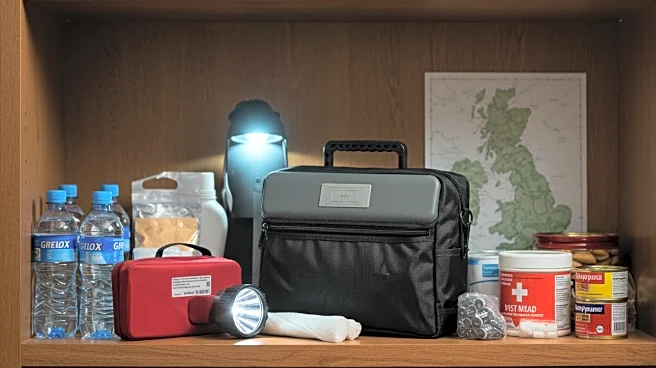What is the story about?
What's Happening?
A recent poll conducted by Yonder Consulting for the Workforce Development Trust has revealed that nearly three-quarters of Britons are willing to alter their daily lives to prepare for national emergencies, such as war or pandemics. The survey found that almost two-thirds of respondents would consider purchasing a government-approved 72-hour survival kit, which includes essentials like drinking water, non-perishable food, and first aid supplies. Additionally, a third of those surveyed expressed readiness to support local volunteer efforts, potentially forming a home guard-style defense group akin to a 'Dad's Army.' The poll, involving over 2,000 adults, also showed strong support for the Government's Resilience Action Plan, launched last month to enhance the UK's preparedness against threats like war, terror attacks, and extreme weather events.
Why It's Important?
The findings underscore a growing public awareness and willingness to engage in national resilience efforts, reflecting recent global and domestic shocks. This shift in attitude is crucial for the successful implementation of the Government's Resilience Action Plan, which aims to fortify the nation's defenses against various threats. The support for survival kits and volunteer groups indicates a proactive stance among citizens, which could lead to more robust community-based emergency response systems. However, the survey also highlights a segment of the population resistant to personal sacrifices, posing a challenge to achieving comprehensive national preparedness.
What's Next?
The Government may consider establishing a 'Citizens Army' to protect critical infrastructure, such as airports and power plants, from potential attacks. This initiative, likened to a 'Dad's Army,' could mobilize volunteers to bolster national security. As the Resilience Action Plan progresses, further engagement with the public and stakeholders will be essential to address concerns and ensure widespread participation. Policymakers and emergency services advisors, like Paul Netherton, emphasize the importance of trust and consent in delivering national preparedness, suggesting ongoing dialogue and education efforts.
Beyond the Headlines
The concept of a 'Citizens Army' raises ethical and logistical questions about civilian involvement in national defense. It challenges traditional roles and responsibilities, potentially reshaping societal norms around security and community engagement. The initiative could foster a culture of resilience, encouraging individuals and workplaces to prioritize preparedness. However, it also necessitates careful consideration of training, resource allocation, and the balance between voluntary and professional security measures.
















